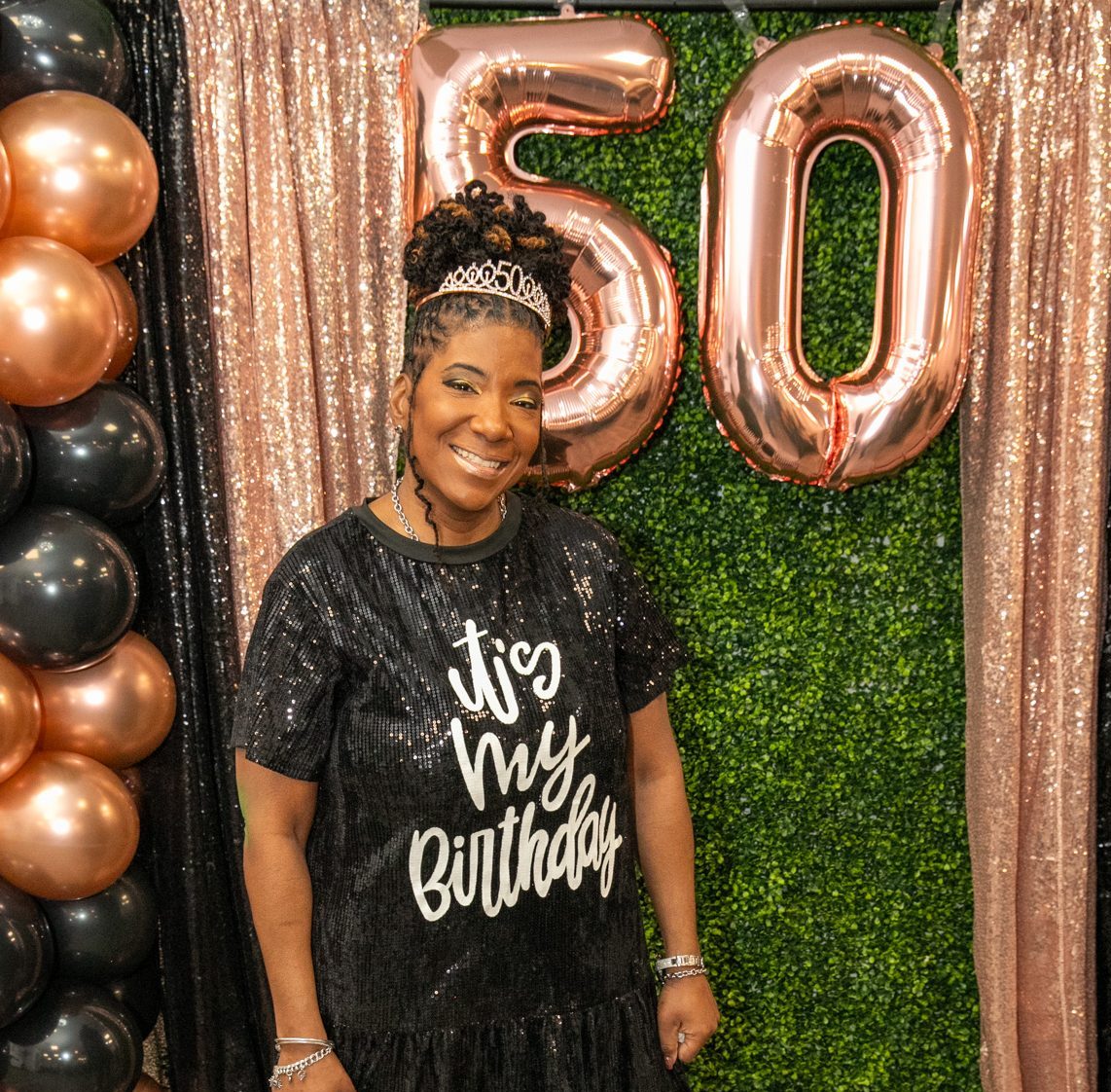Most years, Patricia Gibson decorates her home for Memorial Day—putting up a sign or placing some flags in her flower pots. But this year, when she saw decorations in the store, she paused in the aisle. "Should I decorate some red, white, and blue for outside?" Gibson remembered asking herself. "And I'm just like, no. I'm really not feeling the miracle right now, and who's representing it." Because in February, after working for the federal government for 17 years, Gibson learned that she would lose her job as a contract specialist at the Office of Personnel Management, through no fault of her own.
OPM, essentially the federal government's human resources agency, has historically flown under the radar of the general public. But this winter, Elon Musk and DOGE functionally took over the agency to carry out their campaign of mass firings. As CNN reported in March, OPM employees who previously sent communications to federal agencies watched from the sidelines as Musk's OPM sent a barrage of termination notices to federal employees. One such notice was the "Fork in the Road" email, which offered workers a chance to be paid through September if they left their posts—an attempt to downsize the federal workforce and remove anyone resistant to Trump's agenda.
"A lot of people got bullied into taking that fork in the road but I said, I don't care—you have to walk me out of here," Gibson said. After her team received notice that they were being eliminated under a Reduction in Force, Gibson and her colleagues were placed on a paid administrative leave. Gibson, who was been unable to work since January, was officially terminated this week.
Gibson, who had just turned 50, was three years of service away from early retirement. "At this point now I'll have to pretty much start over," she said. "I think they messed up a lot of people that planned on retiring from the government." Still, Gibson is the kind of person who can find a silver lining in anything. "I may never get this much time off again in my life until I retire," she said. She's been weeding her garden and helping her son on a school project, and the two are going on a cruise this summer. I spoke with Gibson in April about how much she loved her job, the chaotic timeline of her termination, and the uncertainty she feels about her retirement now.
This interview has been edited and condensed for clarity.
When did you know you were interested in working for the government?
I started in the government back in 2008 with Homeland Security. I got interested through taking one of my graduate courses, [which] was project management. They started talking about procurement ... and I'm like, that sounds pretty interesting. From there, that's how I started reading up about it. I ran across someone that worked in procurement at the city of Chicago, and she mentioned that they had an opening. That's how I got my foot in the door at the city of Chicago. Then I left the city of Chicago and went to Homeland Security in Indianapolis.
What does procurement mean?
You buy whatever products and services your agency needs. So at Homeland Security ... I supported primarily the Border Patrol guys. I would buy ammunition, bulletproof vests, the backpacks with the water reservoirs on them, things of that nature. Or computers for different offices, rugged computers for the field offices. Every agency, it's been something different.
Where did you go after?
I left Homeland and went to the Department of Veterans Affairs. I was there for about nine years. I started in the CMOP, which is Consolidated Mail Outpatient Pharmacy, where veterans get their prescriptions in the mail. Some of them come from CMOP in Hines, Illinois. So I would buy the pharmaceuticals. I would buy the machinery to process the pharmaceuticals. And then I bought other things, like medical supplies and laundry facilities at the VA hospitals built from the ground.
After the VA, I left and went to Department of Agriculture, and that was a remote position. ... Right after I got that position, in January of 2020, COVID started. So everybody was closed anyway. I was already at home, so I had beat the gun with that. I was home. I was a grade 12, and a grade 13 [position] opened at OPM. I applied, and that took about a year. ... They called me and asked me if I wanted to interview, and I said yes. I finally got the OPM job, and so that's where I was until that was taken away.
In your long career moving from different federal agencies, did you ever consider working in the private sector?
Up until our new administration came, the government was the most secure job. The most secure career. I would recommend the government to anybody. ... I would always recommend it. I said, "You know, I've never had a problem. I go to work every day. I like my job. I'm supported. Why would I leave?" There was really no reason to leave. [There] was never discontent or doing the employees wrong. I never thought I would have a reason to leave.
I'd love to hear more about what you liked about it. How were the hours or the people?
I was a remote employee at OPM. I had a team that was all over the world. I had teammates in Alabama, Colorado, Ohio. We were all in different parts of the world, but we were a team. We were close-knit. I got to volunteer. I got to help plan our employee conference. I planned special events like a holiday social, a "let's take a break" social or whatever. We had trivia, we had contests. We did things together as a team. ... I looked forward to coming to work every day.
That's why we were so blindsided when, after January 20, when they said we're going to have remote discontinued and have telework discontinued. I thought that they were using terms interchangeably, but they were not. They meant remote [where the worker is fully remote] and telework [where the worker reports to an agency worksite and an alternative workside on a regular basis].
First they told us, if you're near an office, we'll put you in an office within 50 miles. I was like, oh, in Chicago, [there are] a lot of offices near me, so I'm fine. They sent out the Fork in the Road notification from Elon, and there were so many questions not answered.
They used scare tactics. They were threatening people. They said, "This is a really good deal. If you don't take this Fork in the Road, you're going to be fired and you may not be paid for it." ... I've been here for 17 years in the federal government, and with the exception of you taking my job away from me, I plan to be here. So I said, I'll wait it out and see what happens.
They said you will be reassigned to one of OPM eight offices. My nearest office was Kansas City, Missouri. ... We get the letters on February 19, and the reassignment letter says, "You are hereby reassigned to Boyers, Pennsylvania." I'm like, that's nowhere near me, so somebody's map is off.
At that point, I said, it's something coming, and we just have to pray and just try to weather whatever storm is coming. We had started a team chat on our cell phones. We were going back and forth, like, "Hey, did you guys hear anything today?" Basically everything was speculation and rumor at that point. Because nobody knew anything for sure. So we waited, waited, waited. On the 20th of February ... one of my coworkers saw a Reddit post that says OPM procurement team is going to be RIFed tomorrow. We were like, "Huh? Is that us?" ... We were saying, oh my God. Tomorrow. That's us. Like we were watching this train wreck, but couldn't do anything about it.
You mentioned you have this chat with your coworkers. What has the experience been like for you guys as a team to undergo this?
The whole chat was a safe space, because they could have been using our team's chat to say, "Oh, she's complaining. Make sure she's the first one to go." Nobody knew what anybody was doing. ... Everybody's kind of worried. Everybody's kind of in a different place, career-wise. None of us could retire. My branch chief only had seven years. I've got 17. Another person may have 14, but she's not ... as old as I am, so she didn't get quite as much severance. My severance ended up being 46 weeks. So I got a little bit of time to decide if I wanted to take a pay cut.
Everybody was kind of venting. Some people were saying, oh, I took the deferred compensation because I'm sick of all of this and just wanted to be over. And I'm like, I'm gonna wait this out. They're gonna be sick of me. Because I didn't do this. I wanted to stay here.
I was curious if you could talk about how this firing has affected you, whether personally or emotionally, or in terms of your ability to plan for the future?
I took a hit to my self-worth. How could they—after 17 years, and I've always gotten awards and kudos and recommendations and bonuses and things like [that]—how would they just be so heartless? Just discard you like that? That was crazy. Then their plan for the future? So many people are dependent on the federal government, and so once the government started to fire and downsize, then so many other places that did a lot of business with the government were affected.
Now I find myself at 50, unemployed. What's my next step going to be? At this point, I'm just grateful that I have some time to make a decision or do some research about what it is I want to do next.
Many of the folks that I've spoken with for this series have talked about this idea of the federal government being the most stable job you can have.
Not our parents, but our grandparents, will work somewhere their entire career and then retire. The people coming up today, after me, they job hop. Because nothing is stable. And so I get it, but I was saying, "Oh yeah, the federal government is." And they're like, OK, that was the last government, before they fired you. Now at this point, you can't make any plans. Because if Friday is really the date that I'm going to be terminated, then I have to apply for unemployment benefits. And then in 31 days, I'm going to lose my medical, then I have to try to find a medical plan for me and my son. I have to just try to prepare for what's next.
I know that a lot of the federal workers who were fired by DOGE received their notices from OPM, and that Elon Musk used OPM as the vehicle to do all these firings. While you were working there, were you aware of that happening?
I didn't see it, but I know that the notices came from OPM. Because everybody would post on the Reddit, or the other things I would see, and they would say, we got a notice from OPM. All the notices are coming from OPM.
You were saying earlier that, as some of your coworkers were taking these deferred resignation programs, you were very much like, "You're going to have to force me out." Was there a moment when you felt like, "Oh, I've reached my threshold"?
I've never reached that. Because I just knew that I put in 17 years with the federal government, and I was not giving it up to be paid with benefits through September 30. That was not equal to me. You know, if it was like maybe two years or something? OK. You could leave today and we'll pay you for two years in benefits? OK, maybe, because my severance was only 46 weeks. But at the end of the day, 46 weeks versus—it's not even 28 weeks now to September 30, and then you don't get anything else, and they don't want you to come back to the government until after five years have passed if you take the deferred [resignation].
You're not allowed to apply?
No, they've got a cap on that. ... This administration is only going to last four years. He thinks it's more, but he better get out of there. But when a new administration comes in, they can do whatever they want, if they want to retroactively bring back people that were fired, or give them damages, or whatever, they could do that, and the people that [take the buyout] will not be eligible for that.
I wanted to ask if you had any larger fears or concerns.
I have a fear that I won't be able to find a job. That's one fear. A lot of places support the federal government. So right after we were RIFed, I had interviewed with some place that I would have gotten the position, but they lost their contract. That would have been perfect. [But] they lost the contract.
So I'm saying, OK, now I need to look out for places that don't necessarily support the federal government. Now the fear is that I have to take a $20 or $30,000 pay cut. ... I'm trying to just take a little bit of time and—not relax, because I have not been off all this time. I have not had a day where I just sat and watched TV—even though I want to. I haven't. I try to get up every day and research something and do something and look into some companies and get some feelers out on LinkedIn and Indeed and research companies. I've been doing that every day.
I would get up before work. Being at home, I used to lay my clothes out at night to get up, take a shower and come downstairs and start work. My sister is like, "What is wrong with you? You're 10 steps away from your office." I would get up hours before, shower, make breakfast, all that—to be ready to come to work. I came to work every day with a smile. I was that positive person, so nobody at work could ever say, "Oh, she was groaning." Nope, that's not me.
Was there anything else that we haven't had a chance to talk about, that you'd want to touch on?
I think the way we were laid off was really cowardly. Working for the government and working in procurement, I don't even see any other career that I wanted. People get up every day and they say, "Oh, I wish I had my dream job or my dream career." Well, I had mine ... but they took it away from me. ... I hope that they wake up and and have to do, what's the—when they had the the Ghost of Christmas Past and the Ghost of Christmas Present, that Christmas tale? I want them to see and know that they messed up a lot of people. A lot of good, highly educated, trained people for nothing. This was all for nothing because somebody being petty. Because, "this is what I want, and this is my toy. The government's my toy, and it does what I want." That's all it really is.






